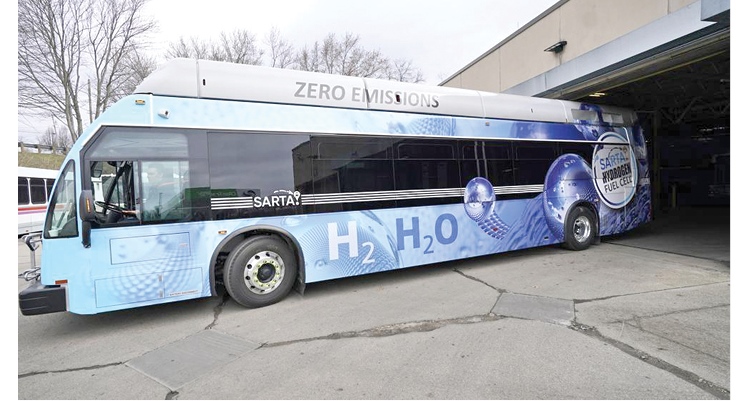
(AP) — Each morning at a transit facility in Canton, Ohio, more than a dozen buses pull up to a fuelling station before fanning out to their routes in this city south of Cleveland.
The buses — made by El Dorado National and owned by the Stark Area Regional Transit Authority — look like any others.
Yet collectively, they reflect the cutting edge of a technology that could play a key role in producing cleaner inter-city transportation. In place of pollution-belching diesel fuel, one-fourth of the agency’s buses run on hydrogen. They emit nothing but harmless water vapour.
Hydrogen, the most abundant element in the universe, is increasingly viewed, along with electric vehicles, as one way to slow the environmentally destructive impact of the planet’s 1.2 billion vehicles, most of which burn gasoline and diesel fuel. Manufacturers of large trucks and commercial vehicles are beginning to embrace hydrogen fuel cell technologies as a way forward. So are makers of planes, trains and passenger vehicles.
Transportation is the single biggest U.S. contributor to climate change, which is why hydrogen power, in the long run, is seen as a potentially important way to help reduce carbon emissions.
To be sure, hydrogen remains far from a magic solution. For now, the hydrogen that is produced globally each year, mainly for refineries and fertilizer manufacturing, is made using natural gas or coal. That process pollutes the air, warming the planet rather than saving it. Indeed, a new study by researchers from Cornell and Stanford universities found that most hydrogen production emits carbon dioxide, which means that hydrogen-fuelled transportation cannot yet be considered clean energy.
Yet proponents of hydrogen-powered transportation say that in the long run, hydrogen production is destined to become more environmentally safe. They envision a growing use of electricity from wind and solar energy, which can separate hydrogen and oxygen in water. As such renewable forms of energy gain broader use, hydrogen production should become a cleaner and less expensive process.
Within three years, General Motors, Navistar and the trucking firm J.B. Hunt plan to build fuelling stations and run hydrogen trucks on several U.S. freeways. Toyota, Kenworth and the Port of Los Angeles have begun testing hydrogen trucks to haul goods from ships to warehouses.
Volvo Trucks, Daimler Trucks AG and other manufacturers have announced partnerships, too. The companies hope to commercialize their research, offering zero-emissions trucks that save money and meet stricter pollution regulations.
In Germany, a hydrogen-powered train began operating in 2018, and more are coming. French-based Airbus, the world’s largest manufacturer of airliners, is considering hydrogen as well.
“This is about the closest I’ve seen us get so far to that real turning point,” said Shawn Litster, a professor of mechanical engineering at Carnegie Mellon University who has studied hydrogen fuel cells for nearly two decades.
Hydrogen has long been a feedstock for the production of fertilizer, steel, petroleum, concrete and chemicals. It’s also been running vehicles for years: Around 35,000 forklifts in the United States, about 4% of the nation’s total, are powered by hydrogen. Its eventual use on roadways, to haul heavy loads of cargo, could begin to replace diesel-burning polluters.
No one knows when or even whether, hydrogen will be adopted for widespread use. Craig Scott, Toyota’s head of advanced technology in North America, says the company is perhaps two years from having a hydrogen truck ready for sale. Building more fuelling stations will be crucial to widespread adoption.
Kirt Conrad, CEO of Canton’s transit authority since 2009, says other transit systems have shown so much interest in the technology that SARTA takes its buses around the country for demonstrations. Canton’s system, which bought its first three hydrogen buses in 2016, has since added 11. It’s also built a fuelling station. Two California transit systems, in Oakland and Riverside County, have hydrogen buses in their fleets.
“We’ve demonstrated that our buses are reliable and cost-efficient, and as a result, we’re breaking down barriers that have slowed wider adoption of the technology,” Conrad said.
The test at the Port of Los Angeles started in April, when the first of five semis with Toyota hydrogen powertrains began hauling freight to warehouses in Ontario, California, about 60 miles away. The $82.5 million public-private project eventually will have 10 semis.
Hydrogen fuel is included in President Joe Biden’s plans to cut emissions in half by 2030. The infrastructure bill the Senate approved passed this week includes $9 billion for research to reduce the cost of making clean hydrogen, and for regional hydrogen manufacturing hubs.
The long-haul trucking industry appears to be the best bet for early adoption of hydrogen. Fuel cells, which convert hydrogen gas into electricity, provide a longer range than battery-electric trucks, fare better in cold weather and can be refuelled much faster than electric batteries can be recharged.
Proponents say the short refuelling time for hydrogen vehicles gives them an edge over electric vehicles for use in taxis or delivery trucks, which are in constant use.
Source : TRN,






